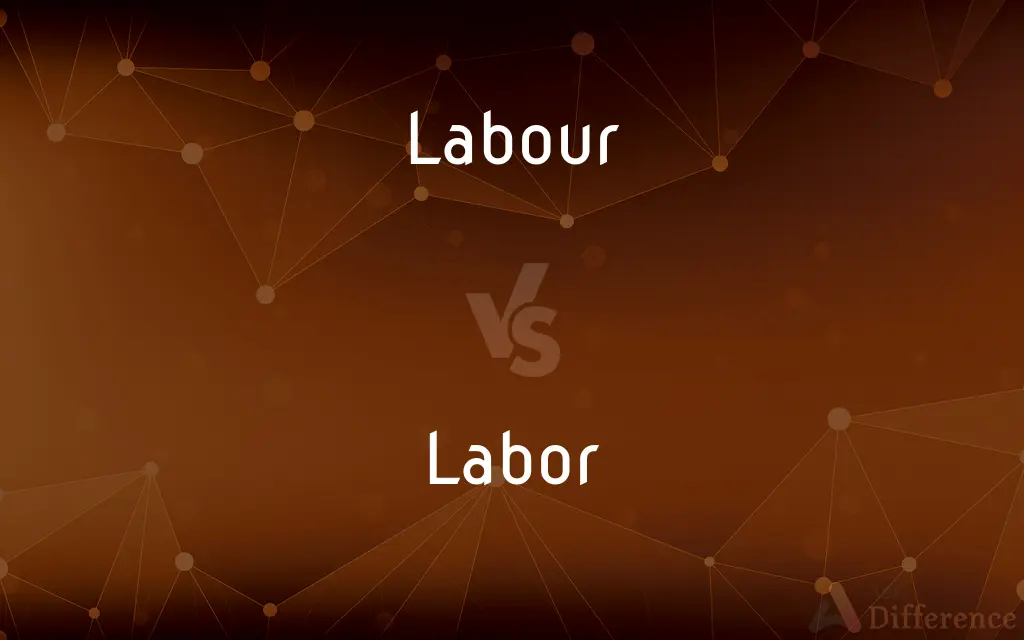Labour vs. Labor — What's the Difference?
By Tayyaba Rehman — Updated on October 3, 2023
Labour is British English spelling; Labor is American English spelling. Both refer to work, especially physical effort.

Difference Between Labour and Labor
Table of Contents
ADVERTISEMENT
Key Differences
Labour, with a "u", is the preferred spelling in British English. It encompasses tasks demanding physical effort, as well as the collective workforce in an industry or country. In contrast, Labor, without the "u", is the American English version. Both terms describe work that demands energy or skill.
The Labour Party is a significant political party in the UK, demonstrating its embeddedness in British culture. However, in the US, Labor Day is a federal holiday celebrated in early September, representing the American way of spelling and its cultural relevance.
To an untrained eye, Labour and Labor might appear as mere variants of the same word, and in essence, they are. The difference in spelling reflects the nuances and developments in the English language as it traveled across the Atlantic. The distinction is akin to "colour" in British English and "color" in American English.
For the British, seeing "Labour" on a document signifies consistency with their linguistic norms. For Americans, "Labor" feels right, in line with other American English spellings. While they differ by a single letter, their meanings in the context of work and effort remain the same.
Comparison Chart
Spelling Origin
British English
American English
ADVERTISEMENT
Example Usage
The Labour Party
Labor Day
Common in
UK, Australia, Canada among others
USA
Associated Phrases
Labour of love, labour-intensive
Labor unions, labor force
In Publications
Seen in British publications
Common in American media
Compare with Definitions
Labour
Workers considered as a group.
The factory employed local labour.
Labor
Work, especially hard physical work.
They put in hours of labor to complete the house.
Labour
Physical or mental work.
She was in labour for 12 hours.
Labor
The process of childbirth.
Her labor lasted 10 hours.
Labour
The process of childbirth.
The labour was smooth and without complications.
Labor
Workers considered collectively.
The labor union negotiated better wages.
Labour
Work, especially physical work
Manual labour
The price of repairs includes labour, parts, and VAT
Labor
Physical or mental exertion, especially when difficult or exhausting; work.
Labour
The Labour Party
The Labour leader
Labor
A specific task or effort, especially a painful or arduous one
"Eating the bread was a labor I put myself through to quiet my stomach" (Gail Anderson-Dargatz).
Labour
The process of childbirth from the start of uterine contractions to delivery
A woman in labour
Labor
A particular form of work or method of working
Manual labor.
Labour
A group of moles
A labour of moles toils with the Earth
Labor
Work for wages
Businesses paying more for labor.
Labour
Work hard; make great effort
They laboured from dawn to dusk
She was patiently labouring over her sketchbooks
Labor
Workers considered as a group.
Labour
Have difficulty in doing something despite working hard
United laboured against confident opponents
Labor
The trade union movement, especially its officials.
Labour
(of a woman in childbirth) be in labour
She laboured very well and comfortably because she was relaxed
Labor
Labor A political party representing workers' interests, especially in Great Britain.
Labour
Variant of labor.
Labor
The process by which childbirth occurs, beginning with contractions of the uterus and ending with the expulsion of the fetus or infant and the placenta.
Labour
Effort expended on a particular task; toil, work.
Labor
To work; toil
Labored in the fields.
Labour
That which requires hard work for its accomplishment; that which demands effort.
Labor
To strive painstakingly
Labored over the needlepoint.
Labour
(uncountable) Workers in general; the working class, the workforce; sometimes specifically the labour movement, organised labour.
Labor
To proceed with great effort; plod
Labored up the hill.
Labour
(uncountable) A political party or force aiming or claiming to represent the interests of labour.
Labor
(Nautical) To pitch and roll.
Labour
The act of a mother giving birth.
Labor
To suffer from distress or a disadvantage
Labored under the misconception that others were cooperating.
Labour
The time period during which a mother gives birth.
Labor
To undergo the labor of childbirth.
Labour
(nautical) The pitching or tossing of a vessel which results in the straining of timbers and rigging.
Labor
To deal with in exhaustive or excessive detail; belabor
Labor a point in the argument.
Labour
(historical) A traditional unit of area in Mexico and Texas, equivalent to 177.1 acres or 71.67 ha.
Labor
To distress; burden
I will not labor you with trivial matters.
Labour
A group of moles.
Labor
Of or relating to labor.
Labour
(intransitive) To toil, to work.
Labor
Labor Of or relating to a Labor Party.
Labour
(transitive) To belabour, to emphasise or expand upon (a point in a debate, etc).
I think we've all got the idea. There's no need to labour the point.
Labor
Standard spelling of labour
Labour
To be oppressed with difficulties or disease; to do one's work under conditions which make it especially hard or wearisome; to move slowly, as against opposition, or under a burden.
Labor
Physical toil or bodily exertion, especially when fatiguing, irksome, or unavoidable, in distinction from sportive exercise; hard, muscular effort directed to some useful end, as agriculture, manufactures, and like; servile toil; exertion; work.
God hath setLabor and rest, as day and night, to menSuccessive.
Labour
To suffer the pangs of childbirth.
Labor
Intellectual exertion; mental effort; as, the labor of compiling a history.
Labour
(nautical) To pitch or roll heavily, as a ship in a turbulent sea.
Labor
That which requires hard work for its accomplishment; that which demands effort.
Being a labor of so great a difficulty, the exact performance thereof we may rather wish than look for.
Labour
Same as labor; - British spelling.
Labor
Travail; the pangs and efforts of childbirth.
The queen's in labor,They say, in great extremity; and fearedShe'll with the labor end.
Labour
A social class comprising those who do manual labor or work for wages;
There is a shortage of skilled labor in this field
Labor
Any pang or distress.
Labour
Concluding state of pregnancy; from the onset of labor to the birth of a child;
She was in labor for six hours
Labor
The pitching or tossing of a vessel which results in the straining of timbers and rigging.
Labour
A political party formed in Great Britain in 1900; characterized by the promotion of labor's interests and the socialization of key industries
Labor
A measure of land in Mexico and Texas, equivalent to an area of 177
Labour
Productive work (especially physical work done for wages);
His labor did not require a great deal of skill
Labor
A stope or set of stopes.
Labour
Work hard;
She was digging away at her math homework
Lexicographers drudge all day long
Labor
To exert muscular strength; to exert one's strength with painful effort, particularly in servile occupations; to work; to toil.
Adam, well may we labor still to dressThis garden.
Labour
Strive and make an effort to reach a goal;
She tugged for years to make a decent living
We have to push a little to make the deadline!
She is driving away at her doctoral thesis
Labor
To exert one's powers of mind in the prosecution of any design; to strive; to take pains.
Labour
Undergo the efforts of childbirth
Labor
To be oppressed with difficulties or disease; to do one's work under conditions which make it especially hard, wearisome; to move slowly, as against opposition, or under a burden; to be burdened; - often with under, and formerly with of.
The stone that labors up the hill.
The line too labors, and the words move slow.
To cure the disorder under which he labored.
Come unto me, all ye that labor and are heavy laden, and I will give you rest.
Labour
A task that's difficult and continuous.
Writing the novel was a labour of love.
Labor
To be in travail; to suffer the pangs of childbirth; to be in labor.
Labour
Diligent effort or exertion.
The project required hours of hard labour.
Labor
To pitch or roll heavily, as a ship in a turbulent sea.
Labor
To work at; to work; to till; to cultivate by toil.
The most excellent lands are lying fallow, or only labored by children.
Labor
To form or fabricate with toil, exertion, or care.
Labor
To prosecute, or perfect, with effort; to urge strenuously; as, to labor a point or argument.
Labor
To belabor; to beat.
Labor
Productive work (especially physical work done for wages);
His labor did not require a great deal of skill
Labor
A social class comprising those who do manual labor or work for wages;
There is a shortage of skilled labor in this field
Labor
Concluding state of pregnancy; from the onset of labor to the birth of a child;
She was in labor for six hours
Labor
An organized attempt by workers to improve their status by united action especially via labor unions (especially the leaders of this movement)
Labor
A political party formed in Great Britain in 1900; characterized by the promotion of labor's interests and the socialization of key industries
Labor
The federal department responsible for promoting the working conditions of wage earners in the United States; created in 1913
Labor
Any piece of work that is undertaken or attempted;
He prepared for great undertakings
Labor
Strive and make an effort to reach a goal;
She tugged for years to make a decent living
We have to push a little to make the deadline!
She is driving away at her doctoral thesis
Labor
Work hard;
She was digging away at her math homework
Lexicographers drudge all day long
Labor
Undergo the efforts of childbirth
Labor
A task requiring significant effort.
The research was a labor of love.
Labor
Toil or exertion.
He labored in the fields from dawn to dusk.
Common Curiosities
What does Labor Day celebrate in the US?
It honors the American labor movement and contributions of workers.
Is the Labour Party related to work?
Yes, in the context of workers' rights and representing the working class in the UK.
Can Labour also mean giving birth in the US?
Yes, but it would be spelled "labor" in American English.
Why do Americans use Labor without a "u"?
Linguistic evolutions and differences in American and British English led to variations like "color/colour" and "labor/labour."
Is there a difference in meaning between Labour and Labor?
No, the primary difference is the British (Labour) versus American (Labor) spelling.
Is it wrong for an American to use "Labour"?
Not "wrong", but "Labor" is standard in American English.
Can "Labour" refer to workers as a group?
Yes, as in "manual labour" or "the labour force."
Are "laboured breathing" and "labored breathing" the same?
Yes, the only difference is British vs. American spelling.
Do both "Labour" and "Labor" come from the same root?
Yes, both derive from Latin "labor" meaning "toil, exertion."
Which countries primarily use "Labour"?
The UK, Canada, Australia, and others following British English norms.
How does one celebrate Labor Day in the US?
It's a federal holiday, often marked by parades, barbecues, and end-of-summer festivities.
Does "Labor" always mean physical work?
No, it can also refer to mental effort or the process of childbirth.
Is "Labour" ever used in American publications?
Rarely, unless referencing the British spelling or context.
How did the spellings diverge between countries?
Language evolution, influenced by various factors like immigration and cultural developments.
Are there other English words with similar US/UK spelling differences?
Yes, examples include "color/colour", "honor/honour", and "favor/favour".
Share Your Discovery

Previous Comparison
Brussels vs. Sprout
Next Comparison
Awaiting vs. WaitingAuthor Spotlight
Written by
Tayyaba RehmanTayyaba Rehman is a distinguished writer, currently serving as a primary contributor to askdifference.com. As a researcher in semantics and etymology, Tayyaba's passion for the complexity of languages and their distinctions has found a perfect home on the platform. Tayyaba delves into the intricacies of language, distinguishing between commonly confused words and phrases, thereby providing clarity for readers worldwide.














































